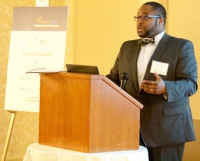 The core curriculum of the Residency Program in Orthopaedic Surgery consists of a one-year categorical surgery internship and four years in orthopaedic surgery. Eight positions are offered each year through the National Residency Matching Program. After completing the internship, four of the eight residents spend one year in orthopaedic research laboratories, where they participate in publishable, cutting-edge scientific investigation while learning the research process in-depth. The other four residents join the four completing the previous laboratory year and together they enter the clinical orthopaedic surgery curriculum. During this period, residents rotate through the affiliated hospitals, assuming increasing clinical responsibility as training progresses. All residents are expected to produce at least one clinical or basic science research publication during their training.
The core curriculum of the Residency Program in Orthopaedic Surgery consists of a one-year categorical surgery internship and four years in orthopaedic surgery. Eight positions are offered each year through the National Residency Matching Program. After completing the internship, four of the eight residents spend one year in orthopaedic research laboratories, where they participate in publishable, cutting-edge scientific investigation while learning the research process in-depth. The other four residents join the four completing the previous laboratory year and together they enter the clinical orthopaedic surgery curriculum. During this period, residents rotate through the affiliated hospitals, assuming increasing clinical responsibility as training progresses. All residents are expected to produce at least one clinical or basic science research publication during their training.
The curriculum also includes a recurring two-year cycle of core lectures, seminars, and presentation. Basic science lectures cover topics such as physiology, pathology, biomechanics, biomaterials, molecular biology, biochemistry, metabolism, and genetics. An anatomy course with cadaver dissection is held each summer for six weeks. Grand Rounds are held weekly, with at least one session per month featuring a distinguished professor. Weekly clinical lectures relate to subspecialty areas, including foot and ankle, spine, sports, adult reconstruction, hand, shoulder, trauma, oncology, and pediatrics. The chairman holds a special breakfast session with the residents to discus issues related to education, research, patient care, and the changing practice environment.

